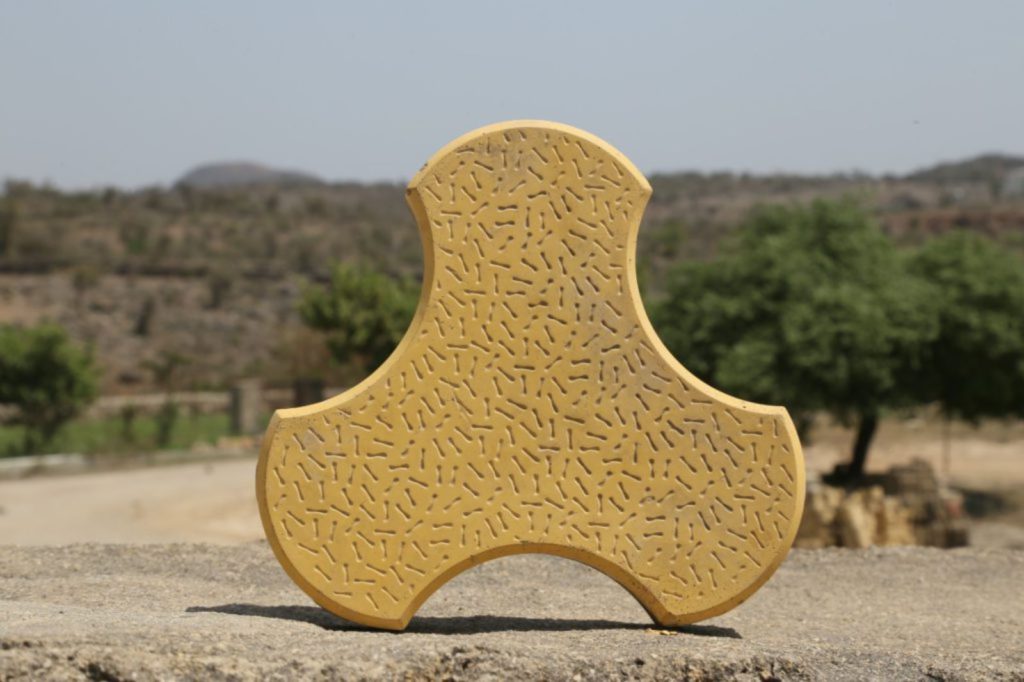Manufactured Sand Udaipur| M Sand | Crushed Sand Rajasthan India
Interlocking Paver Blocks In Udaipur
Interlocking Paver Block (IPB) has been widely utilized in various nations at some point as a particular critical thinking method for giving asphalt in regions where traditional kinds of development are less tough because of numerous functional and ecological limitations. IPB innovation has been presented in India in development, 10 years ago, for explicit necessity viz. pathways, parkings, and so on however presently being taken on widely in various purposes where the customary development of asphalt utilizing hot bituminous blend or concrete substantial innovation isn’t attainable or desirable.
The paper abides upon material, development, and laying off the substantial concrete block as another methodology in the development of asphalt utilizing Interlocking Paver Blocks In Udaipur.
Interlocking Paver Blocks Manufacturer in Udaipur
Concrete paver blocks were initially used in Holland in the 1950s as a replacement for paver blocks that had become scarce due to the postwar construction boom. These blocks were rectangular in shape and had pretty much similar size as the blocks.
During the past 5 decades, the square shape has consistently developed from non-interlocking to somewhat interlocking to completely interlocking to duplicate interlocking shapes. Subsequently, the asphalts in which non-interlocking squares are utilized are assigned as Concrete Block Pavement (CBP) or non-interlocking CBP, and those where to some extent, completely or duplicate interlocking squares are utilized are referred to as ‘Interlocking Concrete Block Pavement (ICBP). Trust the expertise of Interlocking Paver Blocks Manufacturer in Udaipur for premium-quality solutions.
Benefits of Interlocking Paver Blocks
Interlocking Paver Blocks in Rajasthan by Raj Mineral offer several unique features compared to traditional pavement methods, making them a suitable choice for specific areas. Some of these advantages include:
01.
Interlocking Paver Blocks Manufacturer In Udaipur under plant conditions guarantees accessibility of squares having a reliable quality and high layered precision.
02.
Great nature of squares guarantees the strength of asphalts when built to particulars.
03.
IPB endures higher redirections without underlying disappointment and won’t be impacted by warm extension or constriction.
IPB doesn’t need relieving, thus can be opened for traffic following development.
06.
The framework gives prepared admittance to underground utilities without harming asphalt.
07.
Upkeep of IPB is simple and straightforward and it isn’t impacted by fuel and oil spillage.
08.
The utilization of shaded blocks works with long-lasting traffic markings.
09.
IPB is resistant to punching burdens and even shear powers brought about by moving of heavy vehicles
Applications of
Interlocking Paver Blocks
The following are some of the recognized locations where IPB technology is being used:
Building Premises, Pedestrian Plaza, Landscapes, Footpaths, Monuments Premises, Malls, Public Gardens/Parks, Bus Terminus Parking areas, Shopping Complexes, and Railway Platform, etc.
Ports/Dock Yards, Container/Bus Terminals, Heavy-Duty Roads on Expansive Soils, Mining Areas, Factory Floors and Pavements, Roads in Industrial Complexes, Bulk Cargo Handling Areas, Airport Pavement, etc.
City Streets, Boulevard, Intersections/Rotaries on Low Volume Roads, Small Market Roads, Service Stations, Utility Cuts on Arteries, etc.
Office Driveway, Car Parks, Office/Commercial Complexes, Housing Colony Roads, Rural Roads, Farm Houses, Residential Colony Roads, etc.
CLASSIFICATIONS AND SHAPES
There are four generic paver block provided by Interlocking Paver Blocks Supplier In Udaipur forms that correlate to the four types of blocks listed below:
Standard Vertical Paver
Blocks
Interlocking Plain and Curved Paver Blocks
Curved or Corrugated Interlocking Paver Blocks
'L' and 'X' Shaped Interlocking Paver Blocks
Choose Raj Mineral for Interlocking Paver Blocks in Udaipur
“Looking for high-quality interlocking paver blocks in Udaipur? Look no further than Raj Mineral. Discover durable and visually appealing pavers that enhance your outdoor spaces. Contact us today for premium solutions that transform your surroundings.”

IPB innovation can give tough and manageable road infrastructure where development and support of conventional pavements are not practical. Interlocking Paver Blocks In Rajasthan is a lot less expensive than unbending (concrete) pavement intended for identical circumstances. Contrasted with the bituminous pavement for low traffic volumes and high strength subgrade, the underlying development cost of IPB is probably going to be equivalent to or hardly higher. For high traffic volumes and low strength subgrade, IPB will be less expensive than adaptable pavement.
Rules for using Interlocking Paver Blocks and Specification on Paver Blocks are distributed in Codes and accessible with the Indian Roads Congress and Bureau of Indian Standards which are exceptionally valuable for Indian enterprises and roadway callings for the reception of square pavement technology. Raj Mineral offers high-quality paver blocks manufacturer in Udaipur. These blocks are durable, aesthetically appealing, and perfect for various landscaping and construction projects. With their expertise and commitment to customer satisfaction, Raj Mineral has become a trusted provider of paver blocks in Rajasthan. Whether it’s for driveways, pathways, or outdoor spaces.
Raj Mineral’s interlocking paver blocks are an excellent choice for enhancing the beauty and functionality of any space. Get it from the best Interlocking Paver Blocks in Rajasthan.
Email Address
jaimaheshindustries@yahoo.in info@jaimaheshindustries.com
Phone Numbers
Mobile: +919414169137
Mobile: +919799496137
Phone: 02942460037
Reg. Office Address
50, Gayatri Sadan, Ekling Colony Sec. No. -3, Hiran Magri Udaipur- 313002, (Raj.) India
Factory Address
Village Bansliya, Near Iswal, Badgaon Dist. Udaipur-313002, (Raj.) India

Request A Quote
Do you have question? Send us an email jaimaheshindustries@yahoo.in and we’ll get in touch shortly, or Call us 9414169137, 9799496137, 02942460037. We would be delighted to speak.
Note:Your details are kept strictly confidential as per our Company Privacy Policy.
Get In Touch With Us!
We’ll get in touch shortly, or Call us 9414169137, 9799496137, 02942460037. We would be delighted to speak.
Frequently asked questions
ABOUT INTERLOCKING PAVER BLOCKS
There are several benefits of paver blocks for outdoor settings. They provide improved durability, simple installation, and design flexibility. These blocks are perfect for driveways, pathways, and patios since they require no care, are environmentally friendly, and allow for effective water drainage. Raj Mineral, leading paver blocks supplier in Udaipur, specializes in providing these benefits.
Certainly! Due to its strength, adaptability, and aesthetic appeal, interlocking paver blocks are ideal for residential as well as commercial uses. They may be used to build parking lots, patios, pool decks, walkways, roads, and even heavy-duty places like patios and walkways. Pavers are an adaptable and durable way to improve the appearance and usefulness of any property since they come in a variety of colors, patterns, and sizes.
There are many options for landscaping and paving projects because to the wide variety of forms, sizes, and colors that interlocking paver blocks come in. Because of their adaptability, they may be made in inventive and distinctive ways that compliment any outdoor area while still being strong and simple to install.
Looking for premium interlocking paver blocks in Udaipur? For pavers that will enhance your outdoor settings and are visually attractive, Choose none other than Raj Mineral. For exceptional solutions that genuinely transform your environment, contact us right now. You can follow us on Facebook @rajmineral.
Raj Mineral is the leading paver blocks manufacturer in Udaipur. Discover the essence of grace and sturdiness with us. Use these extraordinary blocks to transform your landscaping and building projects since they skillfully combine strength and beauty. As top paver blocks supplier in Rajasthan, Raj Mineral has gained everlasting confidence as a beacon of dependability and client satisfaction.
Their unique interlocking paver blocks, a beautiful mix of beauty and utility, will elevate your driveways, paths, and outdoor areas. Choose Raj Mineral, the premier supplier of Interlocking Paver Blocks in Rajasthan, to experience the height of artistry and sophistication. Today, release the full potential of your places!
Interlocking paver blocks do require maintenance. Regular cleaning is required to get rid of dirt, weeds, and stains. Additionally, keeping an eye out for any shifting or damage and taking immediate action to fix it can help maintain their durability and look. The lifetime and effectiveness of the paver installation are ensured by proper maintenance.

